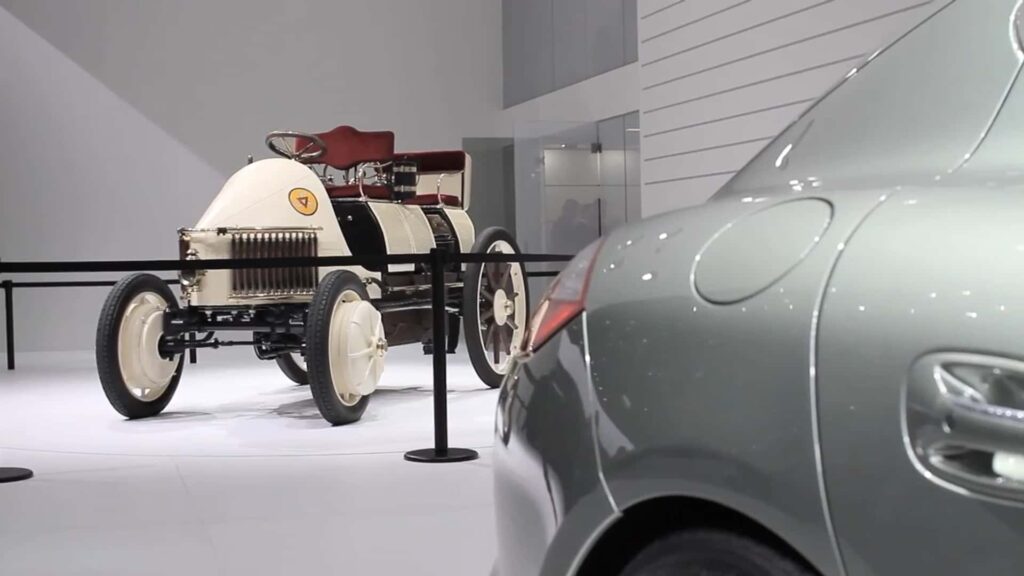The Lohner-Porsche Mixte, an extended-range electric vehicle from 1901, stands out as a remarkable chapter in automotive history. Designed by Ferdinand Porsche, the German automotive engineer renowned for founding Porsche AG and creating the iconic Volkswagen Beetle, this vehicle was truly ahead of its time.
Porsche’s initial automotive designs were electric vehicles, created while he was working for Jakob Lohner & Company in Vienna. These early EV prototypes featured innovative technologies such as in-wheel hub motors and four-wheel brakes. However, they were limited by the range of the lead batteries available at the time, which could only provide a range of 31 miles (50 kilometers).
To address this limitation, Porsche ingeniously added a gasoline engine as an onboard generator to the Mixte. This range extender, similar to modern-day examples like the Mazda MX-30 R-EV, significantly increased the vehicle’s range, making it more practical for everyday use.
The Mixte was produced in around 300 examples, making it the world’s first production all-wheel-drive vehicle. While the original pure electric prototype was the first all-wheel-drive vehicle ever created, the Mixte was the first to be produced on a larger scale. The series model featured a smaller battery pack than Porsche’s BEV designs, with the combustion engine continuously running to keep it charged and ready to move the car.
Although very few of the 300 examples were all-wheel-drive quad-motor cars, there were various body styles, including two-seaters with front-wheel drive and larger vehicles for transporting cargo. Sadly, none of these original vehicles have survived. However, in 2011, Porsche unveiled a meticulously reconstructed two-motor front-wheel drive variant, which is now on display at the Porsche Museum in Stuttgart.
Today, Porsche continues its legacy of innovation in the electric vehicle market. The company currently offers electric models like the Taycan and Macan, with plans to introduce an electric Cayenne and electric replacements for the 718 Cayman and Boxster sports cars. While Porsche has not announced any immediate plans to add range extenders to its electric lineup, other manufacturers are actively developing extended-range EVs for release in the near future. Ferdinand Porsche’s pioneering work in the early 1900s laid the foundation for the electric vehicles we see on the roads today, inspiring a new era of sustainable mobility. The world of fashion is constantly evolving, with new trends and styles emerging every season. From bold colors and patterns to minimalist designs, there is something for everyone to experiment with and express their personal style. In recent years, sustainable fashion has become a major focus for designers and consumers alike, as the industry looks for ways to reduce its environmental impact.
One of the key trends in sustainable fashion is the use of recycled materials. Designers are finding innovative ways to repurpose fabrics and materials, giving them a new lease on life and reducing the amount of waste that ends up in landfills. From recycled plastic bottles being turned into activewear to old denim being transformed into new jeans, there are endless possibilities for creating stylish and eco-friendly clothing.
Another important aspect of sustainable fashion is ethical production practices. Many brands are now focusing on fair trade and transparent supply chains, ensuring that workers are paid fairly and treated well. By supporting these brands, consumers can feel good about the clothes they are wearing and the impact they are having on the world.
In addition to using recycled materials and ethical production practices, sustainable fashion also encompasses the concept of timeless design. Instead of following fleeting trends, sustainable fashion focuses on creating pieces that will stand the test of time and be worn for years to come. This not only reduces the amount of clothing that ends up in landfills, but also encourages consumers to invest in quality pieces that they will cherish for a long time.
As consumers become more conscious of the environmental and social impact of their clothing choices, the demand for sustainable fashion is only expected to grow. Brands that prioritize sustainability are not only meeting this demand but also setting a positive example for the industry as a whole. By choosing to support these brands, consumers can make a real difference in the world of fashion and help create a more sustainable future for all.

